The eye of the storm was clearly over our home last week. We could count the distance of the storm “one one-thousand, two one-thousand, three one-thousand, four…” miles away. Rain made muddy puddles in our backyard, but there was no water approaching our threshold. Our tallest palm tree (over 20 feet) suffered the loss of its cracked upper canopy, but we were spared any falling branches or major debris.
It wasn’t until I opened my Facebook app on Sunday morning that I realized how devastating the weather had been. Less than a mile from my home, people’s cars were crushed by huge oak limbs, their fences were toppled by gale-force winds, and their power had been out for significant periods of time. People were missing.
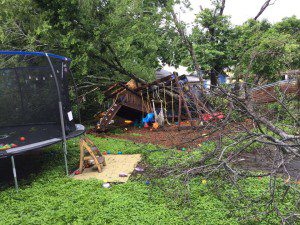
So I turned to Facebook in attempt to find answers, hope, and relief. I found myself streaming through the now hundreds of posts about the flood, particularly the missing victims. Their stories pieced together like one so similar to my own. I didn’t know them, but their lives matter to me. Maybe because I could easily see this happening to our own family. Collecting updates on the missing victims, I discovered people I know, people I’m friends with (IRL, not just on Facebook) know and love these people. It hit a little too close to home. What if it had been my friend with them that weekend? What if we had gone to the lake as planned? I had to turn it off.
With every new post and update came a new plea for prayers, a call to action for local volunteers, and an aching sense of guilt for having experienced none of it. All at once I was connected to the tragedy and yet so untouched by it myself. No matter how many bottles of water I donated or branches I cleared I couldn’t shake this sense of disconnect from my own community.
It didn’t stop at Facebook. In line to check out at H-E-B, I saw people collecting funds to aid relief efforts for the Red Cross. Sitting in the carpool lane, simultaneous alerts rang out in monotony, warning of more severe weather. At an evening meeting, a moment of silence was taken to reflect on the suffering and loss experienced in our community. I felt helpless and deeply guilty.
I couldn’t bring myself to ask why there are families suffering the loss of loved ones while our family was left so completely unscathed by the storm. I couldn’t cast blame on the victims for staying put during the storm. I couldn’t be mad that the rising water levels also meant our decade-long drought was coming to an end.
The worry was only enhanced by the constant barrage of updates on social media. I don’t know these people, but I’m invested in their stories. I’m not usually a worrier, but this sudden tragedy amplified everywhere I turned. This was not healthy.
Then someone said something in one of these meetings when we took a moment to reflect: “You can do anything but not everything.” The more I thought about this, the less it sounded like a warning to Type-A women who spread themselves too thin and the more it sounded like a prompt to be proactive and prioritize.
If I was going to do anything for anybody it was going to be my kids. I was going to start by being a good example. Sometimes the best thing we can do for our kids is show them how helping others can help us feel less helpless. So the next time we stood in line at the checkout at H-E-B I stopped to talk to “O” about how everyone needs water to live but not everyone can just turn on the faucet, so we’re helping them by buying water and donating money. The next time I was on Facebook I didn’t just show solidarity by “liking” a photo of destruction. I made a comment to my friend, grateful she was safe. When I heard the next all-too-familiar tone of the severe storm warning, I said a little prayer, and I started out by saying, “Thank you.”
It started to dawn on me that this mantra—“you can do anything, but not everything”—is also about practicing compassion and acceptance. It is about keeping things in perspective. How can I be truly compassionate towards others without having compassion for myself? How can I expect others to keep themselves safe if I make myself too busy to take care of myself? What am I demonstrating to my children by trying to compensate for my feelings? I don’t have to experience the loss directly to have empathy for those who did. It’s not about me or what I can or can’t do; it’s about acknowledging what happens in life and deciding what we will do when we are given a choice, even if what we do seems so small in comparison to others. We get to decide that it matters. It is enough.
I was reminded of the story about the many starfish stranded on shore and the one starfish thrown back into the ocean. Hopefully this past week we’ve made a difference. Even if we’ve only managed to put things in perspective and practice compassion and gratitude, it is enough. It matters.




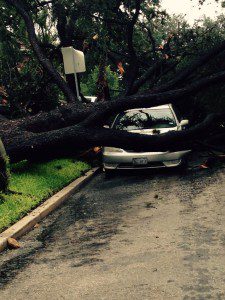
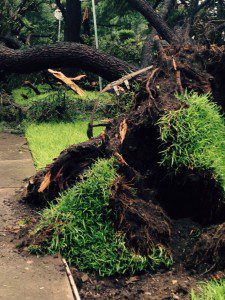
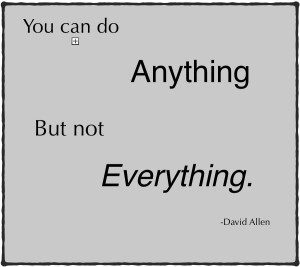
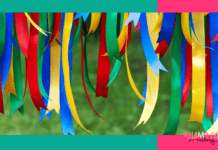







well-said. you put into words what all of us with children were thinking and experiencing – all of us who weren’t as affected by those floods. what a great way to reaffirm and model empathy and compassion for your children.